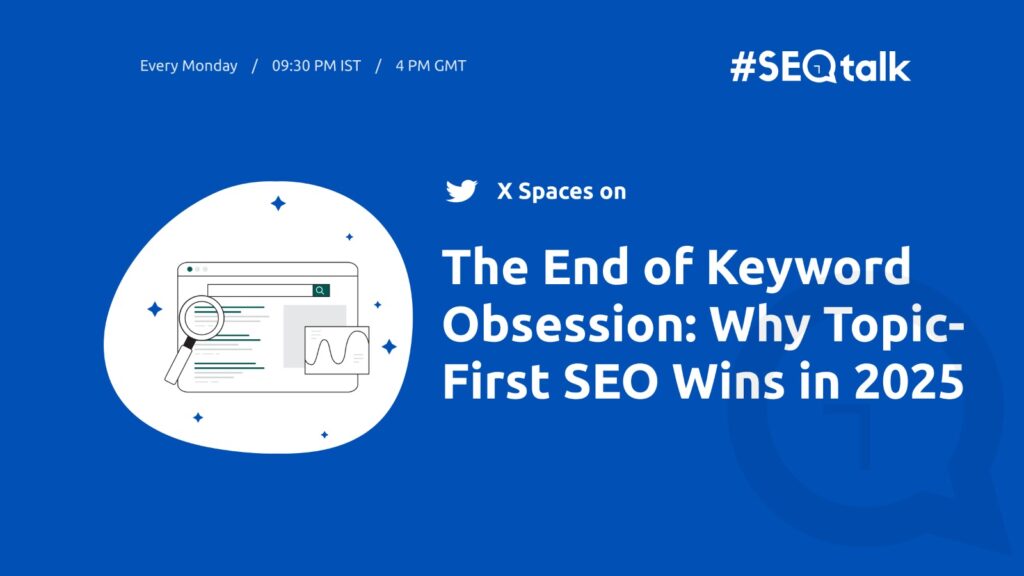SEO in 2025 is no longer defined by chasing isolated keywords. Instead, successful brands are adopting topic-first SEO, focusing on thematic content clusters designed to deeply satisfy user intent and establish topical authority.
This shift is critical as search engines and increasingly, AI-generated answers prioritize context, expertise, and comprehensive coverage.
What Is Topic-First SEO?
Topic-first SEO organizes content strategy around broad themes that matter to your audience.
Rather than optimizing a single page for one target keyword, this approach ensures your website addresses every relevant subtopic within a broader theme.
By doing so, you help search engines understand your authority and improve your site’s visibility for a wider variety of user searches.
As Pritesh shares “Not all keywords are able to actually tell us the exact intent. When you look at real people’s questions on Quora or Reddit, you find the real problems and can offer more effective solutions.”
How Topic-First SEO Differs from Traditional Keyword SEO
Traditional SEO mainly targets specific keywords through on-page optimization and backlinks. The topic-first model expands this to cover all user questions, pain points, and related concepts within a subject.
For example, a site focused on “protein powder” would offer guides on usage, health benefits, vegan options, and common myths, addressing the entire ecosystem around the product.
As the podcast host Parth says, “We create a full topic around fitness nutrition – timing, vegan options, myths, etc, so we cover all subtopics, not just the main keyword.” In this approach, keywords are now subsets of bigger, richer themes.
Why Has Topic-First SEO Become Essential?
Recent advances such as Google’s Helpful Content Update and the spread of AI-powered search have accelerated this shift. Search engines now reward depth, contextual relevance, and comprehensive topical coverage over keyword density.
Moreover, users expect rich, interconnected content that answers their queries holistically, not just snippets matched by keywords.
Dipali, another panelist, summarizes it well: “With AI evolving, it’s the right approach to move from traditional keyword-based SEO to topical authority content.”
Identifying the Right Topics for Your Audience
Strong topic-first SEO begins with understanding your audience’s needs:
Start with business priorities and industry expertise.
Gather real user questions from community spaces (like Reddit, Quora), competitor reviews, and customer interviews.
Use tools like AlsoAsked, Keywords People Use, and SparkToro to uncover untapped subtopics and audience habits.
Map topics to different stages of the user journey (awareness, consideration, decision).
Covering low-volume yet high-intent subtopics can bring valuable, targeted visibility even if search volume data appears small.
Building Topic Clusters and Using Internal Links
A topic cluster consists of a main pillar page that offers an overview of a subject, linked to focused pages on each relevant subtopic. Internal linking within clusters strengthens the relation between content and signals expertise to search engines.
A practical example: HubSpot’s content hub on content marketing is structured with a core pillar and over 20 subtopic pages, each interconnected. This structure improves both SEO and user navigation, boosting authority and engagement.
Is Topic-First SEO Scalable?
This approach is practical for websites of any size. Enterprises like Zapier use programmatic strategies to create and interlink clusters at scale.
The key is a well-structured process that ensures every subtopic is addressed and every internal link is purposeful.
How To Measure Success in a Topic-First World
From what we have understood so far, success KPIs have changed and it should now be measured across:
Total impressions within the main themes.
Engagement metrics such as time on page or depth of session.
Visibility in AI-generated answers and SERP overviews.
Performance of entire content clusters, not just individual articles.
Common Mistakes in Topic-First SEO Implementation
Knowingly or unknowingly, you might still end up missing the mark on certain occasions. As content marketers, we should be careful about the following:
Mistaking keywords for topics, leading to incomplete coverage.
Overlooking “micro-topics” that may have low search volume but high relevance.
Forgetting to link both from new to old and vice versa, which can limit the authority passed within your site.
Prioritizing volume over intent, missing opportunities for conversion-focused content.
As Isha observes, “People create topics with a keyword in mind instead of the problem statement.”
At SEOTalk, we believe that topic-first SEO is the new foundation for sustained rankings and online authority in 2025.
By listening to your audience, covering expansive themes with interlinked content, and prioritizing real questions over arbitrary keyword counts, you build a site structure that search engines and users trust.
What are your thoughts?
